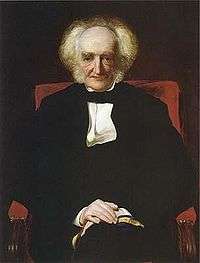Samuel Bignold
Sir Samuel Bignold DL (13 October 1791[1] – 2 January 1875)[2] was a British businessman with insurances and Conservative politician.

Background
Born in Norwich, he was the third and youngest son of Thomas Bignold[3] and his wife Sarah, widow of Julius Long and daughter of Samuel Cocksedge.[4] He was educated at schools in Norwich and Bury St Edmunds.[4]
Career
From 1814, he worked as secretary for the Norwich Union Fire Insurance Company[5] and from 1818 had the same office for the Norwich Union Life Assurance Society,[6] both founded by his father.[4] Although an admirer of Benjamin Disraeli, he rejected the latter's rather dubious request of a loan by the Society; however, after a meeting lent the money from personal funds.[4] In 1866, he arranged the incorporation of the Amicable Society, Britain's oldest life insurance institution.[4]
Bignold was appointed Sheriff of Norwich in 1830[7] and was mayor of that city in the years 1833, 1848, 1853 and lastly 1872.[8] He presented a note of support of the Crimean War from the city of Norwich to the Parliament in 1854, for which he was created a Knight Bachelor.[6] Shortly thereafter, he entered the British House of Commons and sat for Norwich in the following three years.[2] Bignold served as Deputy Lieutenant of Norfolk.[9]
Family
In 1815, he married Elizabeth, the only child of William Atkins[9] and had by her six sons and seven daughters.[4][10] He died in 1875 at Bignold House, which he had bought in 1820 and then had become his head office, and was buried at St Margaret, Old Catton.[4] He left property worth about £120,000 (probate granted 15 February 1875).[11] Bignold's fourth son, Lieutenant-Colonel Charles Bignold (1831–1895) served as Mayor of Norwich between 1894 and 1895, Deputy Lieutenant of Norfolk, and leader of the Conservative Party in that city after 1875.[12]
References
- Norfolk, England, Church of England Baptism, Marriages, and Burials, 1535-1812
- "Leigh Rayment - British House of Commons, Norwich". Archived from the original on 7 April 2017. Retrieved 22 November 2009.
- Dod, Robert P. (1857). The Parliamentary Companion. London: Whitaker and Co. p. 178.
- "Norwich Historic Church Trust - Samuel Bignold 1791-1875". Retrieved 22 November 2009.
- Robert Blake: Esto Perpetua: the Norwich Union Life Insurance Society (1958)
- Dod, Robert P. (1860). The Peerage, Baronetage and Knightage of Great Britain and Ireland. London: Whitaker and Co. p. 118.
- Robert Bignold: Five Generations of the Bignold Family, 1761-1947, and their connection with the Norwich Union (1948)
- M. G. Wiebe; Mary S. Millar; John Alexander; Wilson Gunn, eds. (2004). Benjamin Disraeli Letters: 1857-1859 (2nd ed.). Toronto: University of Toronto Press Inc. pp. 32. ISBN 0-8020-8728-0.
- Walford, Edward (1860). The County Families of the United Kingdom. London: Robert Hardwicke. pp. 53.
- Rosa, one of his daughters, married Edward Henry Bickersteth.
- Oxford Dictionary of National Biography
- Obituary of Charles Edward Bignold, The Banker's Magazine, vol. 60, p. 105 (1895).
External links
- Hansard 1803–2005: contributions in Parliament by Samuel Bignold
| Parliament of the United Kingdom | ||
|---|---|---|
| Preceded by Edward Warner Morton Peto |
Member of Parliament for Norwich 1854–1857 With: Edward Warner |
Succeeded by Henry Schneider Viscount Bury |